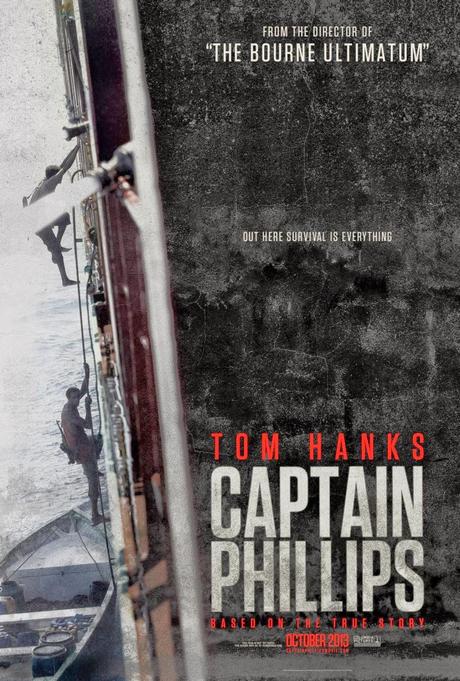
Directed By: Paul Greengrass
Starring: Tom Hanks, Barkhad Abdi, Barkhad Abdirahman
Tag line: "Out here survival is everything"
Trivia: Filming took place off the coast of Malta in the Mediterranean Sea
Every year when the Academy Award nominations are announced, there are usually a few surprises, both in who was nominated and who was passed over. This year, there were two omissions in particular that caught my attention, each relating to the fact-based drama Captain Phillips: Paul Greengrass failing to score a Best Director nod, and star Tom Hanks missing out on his 6th Oscar nomination for Best Actor. As he did in films like Bloody Sunday and United 93, both of which were also inspired by real-life events, Greengrass relied heavily on handheld cameras throughout Captain Phillips to bring a sense of realism to the story. Even more amazing, though, was Tom Hanks as the titular ship’s Captain, delivering what is easily his best performance in over a decade, and arguably his finest ever.
Based on an actual incident that occurred in April of 2009, Captain Phillips tells the story of Richard Phillips (Hanks), a ship’s captain commanding the Maersk Alabama, a commercial container vessel departing from a port city in Oman. While traveling along the African coast, the Maersk Alabama is boarded by four Somali pirates, who, under the leadership of Muse (Academy Award nominee Barkhad Abdi), take control of the ship. When the crew manages to subdue one of the attackers, a standoff ensues, during which Captain Phillips, hoping to get the bandits off his boat before they have a chance to kill anyone, agrees to be the pirate’s prisoner as they escape in the Maersk Alabama’s main lifeboat. After setting a course for Somalia, the lifeboat is intercepted by several U.S. Navy destroyers, which are under strict orders from the President himself to ensure that neither the pirates nor Captain Phillips ever reach Africa.
Director Greengrass’s free-flowing style proved the perfect fit for Captain Phillips, and helped magnify the tension in certain scenes (especially when the pirates first board the ship and are making their way to the bridge). But it was Hanks who had the biggest impact on the picture. It’s not often a performer of his stature can disappear into a role, yet that’s exactly what happens in this film. From his first moments on board the Maersk Alabama, when a tour of the ship turns up a few safety issues, to his captivity on the lifeboat, Tom Hanks is at his tip-top best, and I’d put his performance in the movie’s final ten minutes up against anything he’s done before. For those who think the actor might have lost a step or two over the years, watch the ending of Captain Phillips and I guarantee you’ll change your mind.
As it turned out, 2013 was a pretty good year for lead actors, and, to be honest, I’m not sure who I’d drop from the current list of nominees to make room for Hanks. Christian Bale was brilliant in American Hustle, as was Chiwetel Ejiofor in 12 Years a Slave, and DiCaprio continued to impress in Scorsese’s The Wolf of Wall Street. The remaining nominees, Bruce Dern (Nebraska) and Matthew McConaughey (Dallas Buyers Club), were also superb. Personally, if I had anything to do with it, I would’ve expanded the number of Best Actor nods this year to six, thus clearing the way for Hanks’ turn in Captain Phillips to join the already impressive list above. I mean, if there can be nine Best Picture nominees (Captain Phillips included), why should the acting categories be limited to five slots?
As it stands now, my vote (if I had one) would go to DiCaprio, who lit up the screen with his bravado performance as tycoon Jordan Belfort in The Wolf of Wall Street. Had Hanks made the cut, however, he would have been my hands-down choice for the year’s Best Actor. With Greengrass at the helm, Captain Phillips already had the makings of a very good movie. It was Hanks who turned it into an excellent one.
